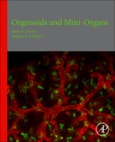Organs and Mini-Organs combines contributions from leading practitioners who work under the editorial control of an acclaimed researcher who also served for eight years as Editor-in-Chief of the journal Organogenesis, the first journal on this topic. The book begins with an introduction, but then delves into chapters that present advice on how to make organoids for many systems. In addition, case studies that illustrate the uses of organioids are presented, along with discussions on future directions and specific problems that need to be solved.
Please Note: This is an On Demand product, delivery may take up to 11 working days after payment has been received.
Table of Contents
PART I INTRODUCTION 1. Organoids and mini-organs: Introduction, history, and potential
PART II CONSTRUCTING ORGANOIDS 2. Elements of organoid design 3. Intestinal organoids: Mini-guts grown in the laboratory 4. Three-dimensional breast culture models 5. Prostate organoids: Directed differentiation from embryonic stem cells 6. Kidney organoids 7. Spontaneous self-assembly of liver organoids from differentiated human cells 8. Cerebral organoids: Building brains from stem cells 9. From organoids to mini-organs: A case study in the kidney
PART III APPLICATIONS OF ORGANOIDS 10. Intestinal organoids: A model for biomedical and nutritional research 11. A three-dimensional neurosphere system using human stem cells for nanotoxicology studies 12. Organoids for modeling kidney disease 13. Intestinal organoids in studying host2bacterial interactions 14. Four challenges for organoid engineers
Authors
Jamie Davies University of Edinburgh.Since 1995 Davies has run his own laboratory at the University of Edinburgh, with a multidisciplinary focus on discovering how mammalian organs construct themselves and how we can use apply knowledge to build new tissues and organs for those in need. Some of the work of his 20-strong research team is 'conventional' developmental biology; identifying signals and mechanisms used in natural organ development. Some is bioinformatic analysis (we host the editorial office of an international database for renal development - www.gudmap.org - funded by the USA National Institutes of Health, and the www.guidetopharmacology.org database, an international effort for the International Union of Basic and Clinical Pharmacology). Some of his work is in tissue engineering - his lab has recently developed a method to produce engineered 'fetal kidneys' from simple suspensions of stem cells, an activity that attracted considerable press attention last year. Finally, his lab is pioneering the application of synthetic biology techniques to tissue engineering, to 'program' cells to make structures that are designed rather than evolved.
Davies has published around 140 research papers in the field of mammalian development, has published one major specialist monograph (Mechanisms of Morphogenesis, Elsevier, 2005 2nd Ed 2014), one public engagement book (Life Unfoloding, OUP, 2013 (Hardback), 2015 (paperback), now in translation also) and has edited three multi-author books in the fields of development, stem cells and tissue engineering. His contributions to research and teaching in this area have been recognized by having been elected a Fellow of the Royal Society of Biology, a Fellow of the Royal Society of Medicine and a Principal Fellow of the Higher Education Academy. Davies served as Deputy Chair of the National Centre for 3Rs, a government agency that promotes research that refines, reduces or replaces animal experiments. He has also served as Editor-in-Chief of the research journal Organogenesis for 8 years, and is currently an Editor of Journal of Anatomy and PLOS One.
Melanie Lawrence University of Edinburgh. Dr Lawrence has been working in the field of organoids for more than 4 years at the University of Edinburgh. She has a keen interest in exploring the functional aspects of organoids, and how this affects their application to in vitro toxicology studies. Lawrence has published research papers in the fields of renal development and organoids, and has co-authored book chapters relating to renal organoids. She has acted as a peer-reviewer for PLOS One and is a regular contributor to a scientific blog (kidneydevelopment.org). In addition, Lawrence is involved in community outreach programs aimed at secondary school children, to inspire the next generation of scientists and to encourage women to consider careers in STEM subjects.







